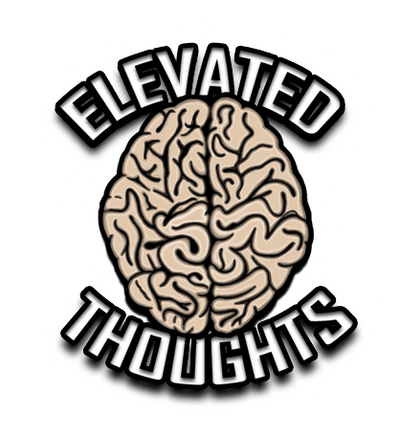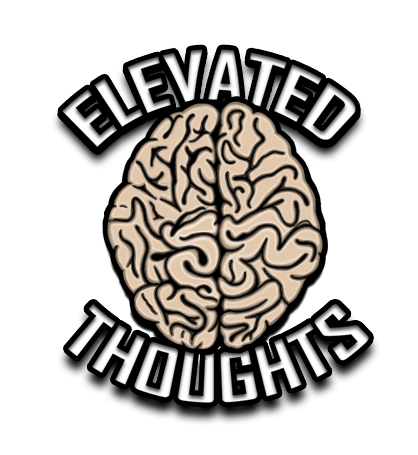PRSPCTV Series IV
April 14, 2021
Peace everyone! Welcome to our PRSPCTV Blog Series IV! I'm Cesar; owner & founder of Elevated Thoughts and your host of PRSPCTV. For our new readers, PRSPCTV (short for perspective) is a blog series I created that breaks down insightful, philosophical quotes; mainly from Stoic philosophers. I do this in order for us to learn how to think critically; not just to understand what these quotes mean, but to help us gain knowledge of self by breaking down the quotes from my perspective; sometimes backed by modern scientific research where it applies. In doing this blog series, I hope you can apply the knowledge to your lives to help you become better selves; while it helps me self-reflect as well. This has the potential to improve the conditions of our society. I don't want to get too far into what PRSPCTV is about; if you're new to the blog be sure to check out our Introduction To PRSPCTV blog. With no further delay, let's get into this quote, break it down and uplift our state of minds 🧠
Quote
"It's not what happens to you, but how you react to it that matters"
- Epictetus
What're your thoughts on this quote? Does it actually matter how you react to situations? If so, what difference does it make? Let's break it down and see what we can gain from it.
The Breakdown
This quote, although short, packs a powerful set of words. From my perspective, Epictetus is pretty much informing the reader to stop and think before you react to a situation. It separates events that occur on the outside of our bodies (in the world around us I.e physically), versus events that occur on the inside (in our minds and feelings I.e mentally and emotionally). It's essentially saying there's a difference between what happens to you (externally), and how you react to it (internally).
You don't have to react to situations in a certain (negative) way. I believe everything and anything can influence us to behave in certain ways. But if we learn to remove all those learned behaviors we are conditioned with by first acknowledging those behaviors, we'll definitely be more self-aware in life.
By learned behaviors, I mean the shit we see; in media and in reality. We see how people react in certain situations and our subconscious picks it up and attempts to mimic those reactions. But sometimes when we experience something, we tend to react similarly to what we've witnessed because we want to able to relate to it. We're social creatures, of course we like to relate to others about the struggles. It makes us feel like we're not alone, so it helps create a support system, so-to speak.
This isn't to downplay struggles by any means, either. We all have our struggles. I've gone through them and continue to go through them every single day. I'm sure some have gone through worse than what I've been through, which I don't refute and highly admire. But no matter what you've gone through or are currently going through, we can all possess emotional intelligence, so you're able to handle unexpected situations much better. To helps realign your entire perspective but you must first acknowledge how you react to events, and WHY you act that way as well.
The only difference between then and now is that I'm able to manage my struggles better because I changed my mindframe, I consciously process most of my emotions before reacting, and have coping mechanisms in place to help me through my struggles. This is known as emotional intelligence. According to Psychology Today, "emotional intelligence refers to the ability to identify and manage one’s own emotions, as well as the emotions of others. Emotional intelligence is generally said to include a few skills: namely emotional awareness, or the ability to identify and name one’s own emotions; the ability to harness those emotions and apply them to tasks like thinking and problem solving; and the ability to manage emotions, which includes both regulating one’s own emotions when necessary and helping others to do the same." This also ties in with having self-awareness. To read more on emotional intelligence, click here to read the article.
There is a possibility that we have a chemical imbalance in our bodies, too. According to medical news outlet Healthline, a chemical imbalance "in the brain is said to occur when the brain has either excessive or insufficient chemicals, called neurotransmitters. Neurotransmitters are natural chemicals that help ease the communication between your nerve cells. Examples include norepinephrine and serotonin." Click here to check out the article. (These articles are not click-baits either, this is information provided for your convenience. It's also for accountability on my part; I don't say things just to say them. I like to back it up with research and facts.)
Further studies are needed to directly link a chemical imbalance to depression and other mental illnesses, so take this information with a grain of salt. From my opinion, I do believe chemical imbalances affect our mental health and overall well-being because everything is interconnected in this existence. Everything requires a balance. Too much of anything could be harmful to us, even what we think wouldn't be possible. Too much water. Too much love. Too much sunlight. When there's an excess of one thing, it causes an imbalance which then leads to deficiencies. If balance isn't restored, deficiencies begin to cause real issues; such as the ones we're dealing with in society today. Global warming, obesity, violence, you name it. All of it originates from a source.
I could write an entire book about this shit. But back to the matter at hand: not reacting to events.
Events that occur in the world around us or externally, are different from events that occur inside of us or internally. Some events that we experience, we cannot really control how we react, like the death of a loved one, for example. Most, if not all of us, would break down and cry. But it's understandable. Events like those are major events dealing with people we love that we don't experience often. But what about the rest of the events that we experience on a daily basis? How are we able to separate the external events from internal ones?
We have to practice self-awareness. By practicing self-awareness, we're able to, well, become more self-aware of every present moment.
The Takeaway
How can I practice self-awareness? What should I do in order to possess emotional intelligence?
It's easier said than done, that's for sure.
Self-awareness requires high levels of awareness. Being mindful of your surroundings. Remaining aware at all times; no matter what you're doing, no matter where you are, no matter who you're with. This is just one aspect of it. Self-awareness is when you're hyper aware about your self through deep reflection. Your thought process, your actions, your body language, your words. Question everything about who you are, why you're that way, and so on. Achieving self-awareness does not happen overnight. As I mentioned before, you have to practice it. Even when you have achieved a certain level of self-awareness, it does not mean you've mastered it. Like a muscle, it requires constant exertion in order for it to grow. But through time, you'll begin to notice that you think before you respond. You learn to set the majority of your emotions aside and respond to situations without allowing those emotions to take over, especially strong emotions such as anger and fear.
In order to possess emotional intelligence, one of the things you must be able to do is associate your emotions to your feelings. As you feel an emotion coming to you, such as anger, you must be able to break that emotion down to the very basis. Why do you feel anger? Is it justifiable? Is that anger based on past experiences? What can you do so you won't feel that same type of anger anymore? Remember: it's not the emotion itself that's bad. At the end of the day, we're human beings. We feel. We experience. The underlying issue is when we get caught up on a certain emotion and our mind magnifies it.
Some of my personal coping mechanisms are listening to music, meditating daily, exercising at the gym, and self reflection. Music, to me, is therapeutic. Meditating helps me embrace the present moment and allows me to become more grounded and calm. Exercising at the gym is also a great way to cope with stress.
Sometimes when I'm feeling down, I remind myself that I should be grateful because I'm still alive and I'm still able to experience life, regardless of what I'm going through. I'm able to breathe, walk, talk, smell, taste, see, etc. I have a family that loves me. I have a job, a means of transportation, food, a roof over my head, and so on. Sometimes we tend to take certain things like that for granted because we have it and use it everyday. Not everybody is as fortunate to have all that we have. I remind myself that not every struggle is permanent, and while I may not be in the best situation, someone out there has it worse than I do. As fucked up as that sounds, it's true. You may think you have it bad, but out of the 7 billion people on earth, yeah; there is definitely somebody out there that has it worse than you. Also, something I've learned over the years of self-reflection and independence: don't set expectations of anyone. When you do, you'll feel upset when you're the one who should take responsibility for setting expectations in the first place. Nobody owes you anything. You're in charge of your own feelings and of your own life.
Here's a few truths I tell myself and others when going through a stressful time.
-
Your situation could be always be better, but it can always be worse at the same time.
-
Any day above ground is a good day.
-
As long as you're alive, there's nothing you can't overcome.
The next time you undergo a certain situation, remember to stop and think before you react. Is it worth getting stressed about? If you answered 'yes', you probably need to practice emotional intelligence and self-awareness more. If you answered 'no', you're getting there! Remember the words of the quote: it's not what happens to you, but how you react to it that matters.
Hope you enjoyed reading the article. Don't forget to do your own research instead of just relying on my words! Most of what I mentioned is backed by science, but remember, this blog series is based on my perspective of these quotes; my understanding of them and my breakdown of it. I highly encourage you to conduct your own research, find your own coping mechanisms, practice emotional intelligence and self-awareness!
Hope you enjoyed this breakdown! Drop a comment and let me know what you think!
Much love everyone,




